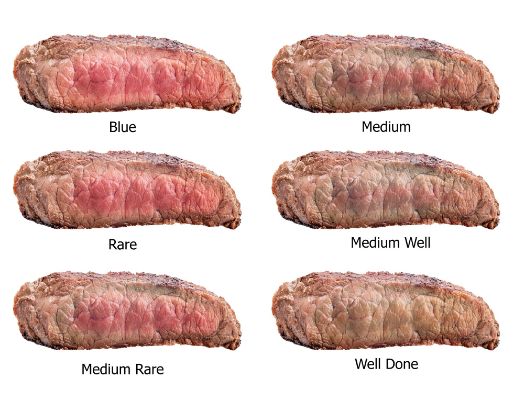Pregnancy is a time when you might find yourself craving your favorite foods, and a delicious steak is no exception. The good news is that with some simple adjustments, many usually off-limits foods can be enjoyed safely during pregnancy.
In this comprehensive guide, we’ll explain everything you need to know about eating steak while pregnant – from how to cook it to ordering it at restaurants and savoring it without any worries.
While we’ll focus primarily on beef steak, it’s important to note that the term “steak” can encompass a variety of meats, including venison, pork, lamb, veal, chicken, turkey, and even fish, when prepared in steak form. So, whether you’re a fan of classic beef or prefer other options, this guide will help you navigate your steak cravings while ensuring your and your baby’s well-being.
While you are pregnant and curious about your health or planning to be a mom, you should know Foods That Help Implantation.

Can You Eat Steak While Pregnant? – Follow The Important Rules
You can eat steak while pregnant, but you should be careful and follow some rules to keep you and your baby healthy.
Eating a well-cooked steak safely and cleanly is usually fine during pregnancy. But you should talk to your doctor for personalized advice if you have any doubts or concerns.
- Cook it well: Make sure the steak is cooked through. This means there should be no pink or red in the middle. The heat kills harmful bacteria that can make you sick.
- Avoid rare or undercooked steaks: It’s best to avoid rare or medium-rare steaks because they might still have harmful bacteria.
- Watch out for cross-contamination: When preparing the steak, be careful not to let it touch other raw meats or surfaces, and wash your hands and utensils well afterward.
- Be mindful of additives: Some marinades or seasonings can be high in salt or other additives. It’s a good idea to choose simpler seasonings to avoid excessive salt or other ingredients that might not be good for your baby.
Nutritional Benefits of Steak During Pregnancy
During pregnancy, expectant mothers must maintain a well-balanced diet to support the growth and development of the baby, as well as to ensure their health. Steak, when consumed in moderation and prepared safely, can offer several nutritional benefits that can be particularly valuable during pregnancy:
- High-Quality Protein: Steak is an excellent source of high-quality protein. Protein is essential for developing the baby’s organs, muscles, and tissues. It also helps in repairing and building maternal tissues.
- Iron Content: Steak is rich in heme iron, a form of iron easily absorbed by the body. Iron is vital during pregnancy because it helps produce red blood cells necessary to transport oxygen to the baby and the mother’s body. Iron deficiency during pregnancy can lead to anemia, fatigue, and complications.
- Vitamin B12: Steak is one of the best dietary sources of vitamin B12. This vitamin is essential for proper neurological development in the baby and helps prevent neural tube defects. It also aids in maintaining healthy nerve function and the production of DNA.
- Healthy Fats: Steak contains healthy monounsaturated fats and omega-3 fatty acids. These fats are essential for the baby’s brain and eye development. Omega-3 fatty acids, in particular, play a crucial role in developing the baby’s nervous system.
- Complete Amino Acid Profile: Steak provides a complete amino acid profile, which is important for synthesizing various proteins and enzymes needed for maternal and fetal health.
- Satiety: The protein and healthy fats in steak can help pregnant women feel full and satisfied, reducing the likelihood of excessive snacking on less nutritious foods.
- Taste and Variety: Pregnant women often experience changes in taste and cravings. Including steak in the diet can provide variety and meet specific taste preferences.
How Should Steak Be Cooked While Pregnant?
Cooking steak to the right internal temperature is important, especially during pregnancy, to make it safe to eat and to minimize the risk of foodborne illnesses. Here’s how you should cook steak while pregnant, using the recommended internal temperatures and guidelines you provided:
- Selecting Safe Cuts: When choosing steak for your meal, lean cuts are typically healthier and lower in saturated fat. Lean cuts include sirloin, tenderloin, and flank steak.
- Preparation: Before cooking, it’s essential to handle the steak properly. Make sure your hands, utensils, and surfaces are clean to prevent cross-contamination.
- Cooking Temperature: For steak, including beef, pork, veal, lamb roasts, steaks, and chops, the recommended internal temperature is at least 145°F (63°C). This temperature ensures that harmful bacteria, like E. coli or Salmonella, are killed, making the steak safe to eat. Use a meat thermometer to verify the internal temperature.
- Rest Time: Allow your steak to rest for at least three minutes after cooking. This resting period allows the internal temperature to stabilize and the juices to redistribute, resulting in a juicier and more flavorful steak.
- Avoid Undercooked Meat: Undercooked or rare steak may carry a higher risk of foodborne illness, so it’s advisable to cook it thoroughly, especially during pregnancy when your immune system might be more vulnerable.
- Ground Meat: If you are considering using ground meat from beef, veal, lamb, or pork, ensure it reaches an internal temperature of at least 160°F (71°C). Ground meats are more susceptible to bacterial contamination because bacteria from the surface can be mixed throughout the meat during grinding.
- Ground Poultry: When cooking ground poultry, such as ground chicken or turkey, it’s vital to cook it to a minimum internal temperature of 165°F (74°C). Poultry carries a higher risk of bacterial contamination, and ensuring it reaches this temperature is critical for food safety.
- Safe Practices: Maintain safe practices while cooking, such as avoiding cross-contamination by keeping raw meat separate from ready-to-eat foods, washing hands and utensils thoroughly, and cleaning surfaces that have come into contact with raw meat.
Can You Eat Medium Steak During Pregnancy?

Eating a medium or undercooked steak during pregnancy is not recommended, and it’s important to understand the reasons behind this advice. Here’s an explanation based on the information provided:
Why You Should Avoid Medium Steak During Pregnancy?
- Foodborne Illness Risk: Medium steak typically contains pink or red portions in the center, indicating it’s cooked to an internal temperature below the recommended 145°F (63°C). Consuming undercooked or raw meat, including medium steak, increases the risk of foodborne illnesses.
- Toxoplasma Parasite: As mentioned, one of the specific concerns during pregnancy is the risk of contracting the toxoplasma parasite. This parasite can be present in undercooked or raw meat, particularly if the meat comes from animals that were infected with toxoplasmosis. Toxoplasmosis is especially concerning during pregnancy because it can potentially harm the baby, leading to congenital disabilities or other complications.
- Food Safety Guidelines: Health authorities advise pregnant women to avoid undercooked meats and poultry to minimize the risk of contracting foodborne illnesses. The guideline for cooking steak to at least 145°F (63°C) with a three-minute rest time ensures that any potentially harmful pathogens are killed, making the steak safe to consume.
- Safety of the Baby: During pregnancy, it’s crucial to prioritize the safety and health of both the expectant mother and the developing baby. Toxoplasmosis and other foodborne illnesses can pose a significant risk to the baby’s well-being, so following food safety recommendations is important.
Conclusion
While steak can be a valuable source of essential nutrients during pregnancy, ensuring its safety through thorough cooking is a top priority. Prioritizing food safety, balanced nutrition, and regular consultations with healthcare providers guarantees the well-being of the expectant mother and the developing baby.
